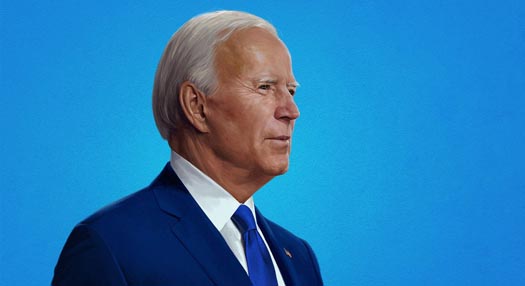
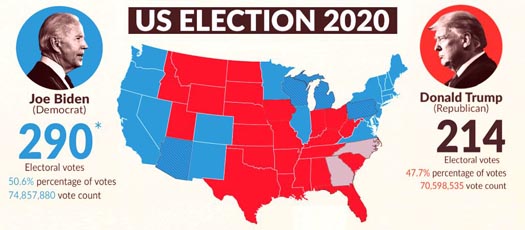 Final vote count still to come, from Arizona and Georgia, that will take Joe Biden to 306.
Final vote count still to come, from Arizona and Georgia, that will take Joe Biden to 306.
On Saturday afternoon, November 7th, 2020, Joseph R. Biden — a former two-term vice president under Barack Obama, and 36-year veteran of the U.S. Senate — became the 46th president of the United States. His running mate, California Sen. Kamala Harris, will become the first woman, first African American, and first Indian American to serve as vice president.
The transition process — already planned for months, and underway in earnest today — is too important to be left to Trump’s whims. Fortunately, this isn’t the President-elect’s first rodeo. Having been an essential part of the incoming Obama administration team that collaborated with George W. Bush’s administration in 2008, Biden knows how a presidential transition is supposed to work. Unfortunately, the U.S. has never had a departing president like Donald J. Trump, who has yet to accept reality, and concede.
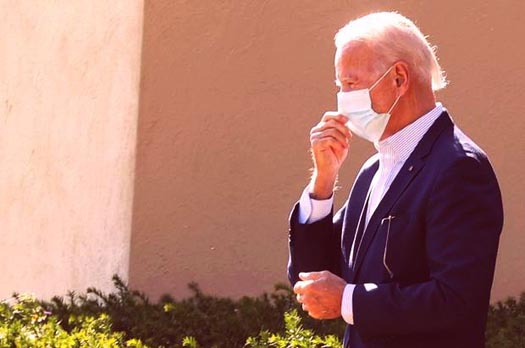
Nonetheless, President-elect Joe Biden signalled on Sunday he plans to move quickly to build out his government, focusing first on the raging pandemic that will likely dominate the early days of his administration, naming former surgeon general, Dr. Vivek Murthy and former Food and Drug Administration commissioner, David Kessler, as co-chairs of a coronavirus working group set to get started; the remaining members of the Transition COVID-19 Advisory Board may be found here.
“People want the country to move forward,” said Kate Bedingfield, Biden deputy campaign manager, in an interview on NBC’s Meet the Press, “and see President-elect Biden & Vice-President-elect Kamala Harris be provided the opportunity to do the work necessary to get the virus under control, and build our economy back to protect the interests of all Americans.”
Joe Biden’s victory has come as a massive relief to many Americans, after four maddening years of a high-octane, anxiety-ridden Trump White House.

For Biden and Harris, their victory marks the end of an unusually low-key, pandemic campaign — but the beginning of a daunting challenge. Biden, who enters the White House as both the chief executive with the most experience in public service in U.S. history and the oldest man to assume the presidency, will take on his duties amid an historic crisis, a pandemic that has already claimed more American lives than World War I, the Korean War, and Vietnam War combined, producing the highest U.S. jobless rates since the brutal, agonizing years of the Great Depression of the 1930s.
VanRamblings will continue to provide coverage of the Biden-Harris transition — and events as they unfold, through the transition period — up until Inauguration Day, on Wednesday, January 20th, 2021.
In this first of many wrap-up columns on the 2020 U.S. election, we’ll leave you with the following peripheral coverage of the Biden-Harris win, and information on the successful and unsuccessful ballot initiatives — but will begin first with coverage of Congress and Senate.
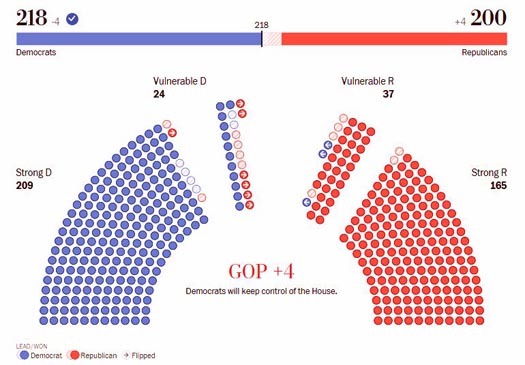 The Democratic Party lost seats in The House on election night, creating tension in the party between centrist Democrats representing conservative districts, and the more progressive congressional representatives from inner city urban districts.
The Democratic Party lost seats in The House on election night, creating tension in the party between centrist Democrats representing conservative districts, and the more progressive congressional representatives from inner city urban districts.
Although Democrats will maintain the majority they won in the blue wave congressional election of 2018 — widely considered to be a repudiation of the policies and the egregious, uncivilized conduct of Donald Trump — the Democrats lost Congressional seats in last week’s U.S. election, as Republican candidates defeated incumbents in conservative-leaning districts in South Carolina, Iowa and New Mexico. Longtime Republicans also held on in Missouri, Michigan and Ohio. The results will mean that House Speaker Nancy Pelosi (D-Calif.) will have the smallest majority in 18 years.
As more centrist members of Congress lashed out at progressive members of Congress, in a post-election interview with the New York Times, Rep. Alexandria Ocasio-Cortez indicated she might quit politics, depending on the hostility of the Democratic Party towards progressive causes.
“I don’t even know if I want to be in politics,” Ocasio-Cortez told The Times. She said the Democratic party has been hostile to progressive causes, like Medicare for All and the Movement for Black Lives.
“I don’t even know if I want to be in politics. You know, for real, in the first six months of my term, I didn’t even know if I was going to run for re-election this year.”
“It’s the incoming. It’s the stress. It’s the violence. It’s the lack of support from your own party. It’s your own party thinking you’re the enemy. When your own colleagues talk anonymously in the press and then turn around and say you’re bad because you actually append your name to your opinion.”

“I chose to run for re-election because I felt like I had to prove that this is real. That this movement was real. That I wasn’t a fluke. That people really want guaranteed health care and that people really want the Democratic Party to fight for them.”
“But I’m serious when I tell people the odds of me running for higher office and the odds of me just going off trying to start a homestead somewhere — they’re probably the same.”
The interview occurred Saturday, shortly after major news networks called the election for President-elect Joe Biden, and after some Democrats blamed progressive messaging for party losses down-ticket.
 John Briggs of Black Hawk, Colo., drops off his presidential ballot, and his negative response to a Colorado ballot initiative, as he rejected a 22-week abortion ban.
John Briggs of Black Hawk, Colo., drops off his presidential ballot, and his negative response to a Colorado ballot initiative, as he rejected a 22-week abortion ban.
In U.S. politics, the process of initiatives and referendums allow citizens of many U.S. states to place new legislation on a popular ballot, or to place legislation that has recently been passed by a legislature on a ballot for a popular vote, a signature reform of the Progressive Era.
New York Times’ indispensable The Daily, on how Americans are absorbing the election
Initiatives and referendums, along with recall elections and popular primary elections, are signature reforms of the Progressive Era; they are written into several state constitutions, particularly in the West.
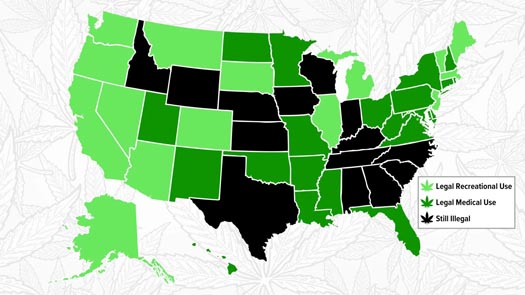 Arising from successful ballot initiatives, marijuana is legal in 36 states across the U.S.
Arising from successful ballot initiatives, marijuana is legal in 36 states across the U.S.
Even as Americans grow more divided politically, marjuana continues to gain ground with every election cycle — 5 states legalized weed in 2020, for recreational use, including Arizona, Mississippi, Montana, New Jersey and South Dakota. The number of states where recreational use is now permitted:15; cannabis (as opposed to THC-free CBD) is still wholly illegal in 14 states. Every other state falls somewhere in-between.
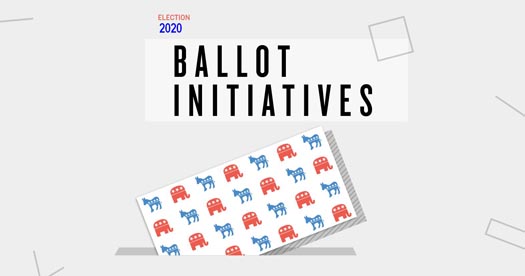
In Florida, a state that voted for Donald Trump 51.2% to Joe Biden’s 47.8%, in a surprising — although, perhaps, not so surprising — development, Floridians approved a ballot initiative to raise the minimum wage to $15. The current minimum wage in Florida is $8.56. The minimum wage in Florida will be raised to $15 an hour over the next six years.
In California, the state’s citizens voted on 12 expensive and important ballot propositions …
Proposition 17, which will give people who are on parole for felony convictions the right to vote, passed, and Proposition 20, which would have increased penalties for some kinds of misdemeanors, failed;
Although homelessness and housing instability were dominant issues facing the state even before the pandemic made them worse, voters soundly rejected Proposition 21, which would have expanded cities’ ability to implement rent control.
Initiatives supported by Governor Gavin Newsom and the state’s Democratic Party, Proposition 19 would give Californians 55 or older a big property tax break when buying a new home. To fund that new tax break, it would curtail a separate tax break Californians may receive on homes inherited from parents and grandparents; and Proposition 15, the complicated, seemingly mundane, but ultimately very consequential measure on Californians’ ballots, if it passes would be one of the biggest tax increases in state history, so that alone is a big deal.
Otherwise, Colorado voters struck down Proposition 115, a measure that sought to ban abortions after 22 weeks of pregnancy. About 60% of state residents voted against the measure. Meanwhile, in a regressive move, more than 62% of Louisiana voters supported an amendment to the state constitution that would limit abortion protections.
Voters in California sided with companies such as Uber and Lyft to prevent the state from enacting a local labour law that would have forced companies to provide basic benefits — such as health insurance, minimum wage, overtime and reimbursement for expenses — to independent contractors. Fifty-eight percent of voters approved Proposition 22.

Voters in Mississippi approved the design of a new state flag, which will include an image of a magnolia, the state flower, and the phrase “In God We Trust.” The previous state flag featured the Confederate Battle Cross. It was retired in June as protests against racial injustice were held nationwide. A majority of voters opted to keep the flag in 2001.
VanRamblings will be back later in the week with more on the U.S. election: Donald Trump’s refusal to concede; that Democrat battle to win the two Georgia Senate seats now up for grabs; and answers (or not) on whether Melania is leaving the Orange One, how long it may be before Drumpf is behind bars; whether the Trumpster will resign his office in December, with a newly-installed Prez Pence pardoning ‘The Beast’ for all past wrongdoings (‘cept, that won’t protect him from New York state prosecutors); and which country will offer Trump asylum when the judicial hammer comes down.
Don’t you just love politics? No? See you back here later this week.
First, though, we’ll leave you with a story, and the accompanying video:
Last month, Academy award-winner and everyone’s best friend, Jennifer Lawrence — now a proud Democrat — revealed Trump made her reconsider political views, admitting she was formerly “a little Republican” and voted for John McCain in her first election. “I grew up Republican. My first time voting, I voted for John McCain. I was a little Republican,” she said during an appearance on Dear Media’s Absolutely Not podcast. But soon, she “changed her politics” after Donald Trump was elected president.
“This is an impeached president who’s broken many laws and has refused to condemn white supremacy, and it feels like there has been a line drawn in the sand. I don’t think it’s right,” she said. “It just changes things for me. I don’t want to support a president who supports white supremacists.”
Following the Democratic convention in August, Lawrence publicly endorsed Joe Biden and Kamala Harris, explaining her reasoning thusly …
“I’m voting for Joe Biden and Kamala Harris this year because Donald Trump has and will continue to put himself before the safety and well-being of America. He does not represent my values as an American, and most importantly as a human being.”
Here’s Ms. Lawrence outside her home, running through the streets in her pyjamas, screaming and dancing around, celebrating the Biden-Harris win.

